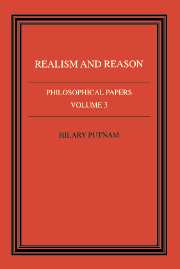Book contents
- Frontmatter
- Contents
- Dedication
- Introduction
- 1 Models and reality
- 2 Equivalence
- 3 Possibility and necessity
- 4 Reference and truth
- 5 ‘Two dogmas’ revisited
- 6 There is at least one a priori truth
- 7 Analyticity and apriority: beyond Wittgenstein and Quine
- 8 Computational psychology and interpretation theory
- 9 Reflections on Goodman's Ways of Worldmaking
- 10 Convention: a theme in philosophy
- 11 Philosophers and human understanding
- 12 Why there isn't a ready-made world
- 13 Why reason can't be naturalized
- 14 Quantum mechanics and the observer
- 15 Vagueness and alternative logic
- 16 Beyond historicism
- Bibliography
- Acknowledgements
- Index
15 - Vagueness and alternative logic
Published online by Cambridge University Press: 06 January 2010
- Frontmatter
- Contents
- Dedication
- Introduction
- 1 Models and reality
- 2 Equivalence
- 3 Possibility and necessity
- 4 Reference and truth
- 5 ‘Two dogmas’ revisited
- 6 There is at least one a priori truth
- 7 Analyticity and apriority: beyond Wittgenstein and Quine
- 8 Computational psychology and interpretation theory
- 9 Reflections on Goodman's Ways of Worldmaking
- 10 Convention: a theme in philosophy
- 11 Philosophers and human understanding
- 12 Why there isn't a ready-made world
- 13 Why reason can't be naturalized
- 14 Quantum mechanics and the observer
- 15 Vagueness and alternative logic
- 16 Beyond historicism
- Bibliography
- Acknowledgements
- Index
Summary
Logic and metaphysics
Michael Dummett (1975) has argued that logic and metaphysics are intimately connected. While Dummett's arguments are based upon considerations from the philosophy of language, rather than upon the actual history of logic and metaphysics, I believe that the history of these subjects suggests that Dummett is right. G. E. L. Owen has pointed out† that the notion of a ‘property’ was neither an evident nor a simple one for either Aristotle or Plato. We can say of a man that he is a ‘white man’; but if we ask whether the man is white in the way that a white wall is white, we shall have to answer ‘no’. What ‘white’ is is not specified, Aristotle thought, until we say what sort of thing we are predicating it of, taking as the standard, or whatever. But what if the term we use to answer this question has the same relativity?
(Modern logic teachers would probably tell their students: ‘in Logic we assume – or pretend – that all terms have somehow been made precise’. According to Owen, Aristotle – and even Plato – worried about this pretense. Is it a pretense that we have done something that we – or some conceivable cognitive extension of ourselves – could in principle do? Or a pretense that we have done a ‘we know not what it would be like’? And who is truly more sophisticated: the modern logic teacher, for whom this is no problem, or the founders of the subject?)
Even the schema ∼ (Px & ∼ Px) becomes problematic if this relativity cannot somehow be avoided when we wish.
- Type
- Chapter
- Information
- Philosophical Papers , pp. 271 - 286Publisher: Cambridge University PressPrint publication year: 1983
- 5
- Cited by



